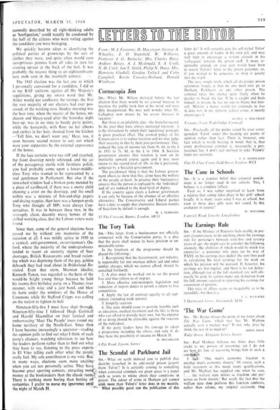cgia
-u-
EDIME
From : M. J. Fennessy. D. Macs,,regor. George A. Wheatley. J. 0. Stansfield, W. Williams, Professor J. G. Bullocke, Mrs. Charles Davy, Andre's' Belsey, A. J. Mcdonald, S. A. Croft. N. 0. Clark. lan 7'. Smith, Philip N. Dane. Mrs. Henrietta Gledhill, Gordon Tullock and Colin Campbell, Kevin Crossley-Holland, Donald Windham.
Cornucopia Jim SIR,—When Mr. Wilson declared before the last election that there would be no general increase in taxation the public took him at his word and were duly disappointed. We may well wonder what Mr. Callaghan now means by `no severe increase in taxation.'
But there is an infallible clue—the Socialist record. In the past they have always increased taxation: it is the instrument by which their 'equalising' principle is given practical effect. The avowed policy of the Conservatives is to reduce taxation and we may judge their sincerity in this by their past performance. They reduced the rate of income tax from 9s. 6d, in the f in 1953 to 7s. 9d. in the f in 1964. A Socialist government ensures that taxation is now on its inevitable upward course again and it may soon return to the record level of 10s. in the f previously achieved by a Socialist government.
The paradoxical thing is that the Labour govern- ment affects to show that they alone have the welfare of the people at heart. In practice their bureaucracy ensures that the person is replaced by the 'individual' and all are reduced to the dead level of digitry.
If the country again elects a Labour government it can only be because of the absence of an effective alternative. The Conservative and Liberal parties have a duty to supply that alternative. Sixteen months of Socialism by default is enough.






































 Previous page
Previous page